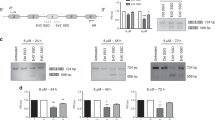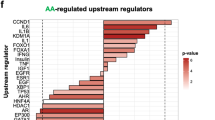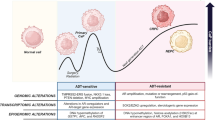Abstract
Angiogenesis is required for tumour growth and is induced principally by vascular endothelial growth factor A (VEGF-A). VEGF-A pre-mRNA is alternatively spliced at the terminal exon to produce two families of isoforms, pro- and anti-angiogenic, only the former of which is upregulated in prostate cancer (PCa). In renal epithelial cells and colon cancer cells, the choice of VEGF splice isoforms is controlled by the splicing factor SRSF1, phosphorylated by serine–arginine protein kinase 1 (SRPK1). Immunohistochemistry staining of human samples revealed a significant increase in SRPK1 expression both in prostate intra-epithelial neoplasia lesions as well as malignant adenocarcinoma compared with benign prostate tissue. We therefore tested the hypothesis that the selective upregulation of pro-angiogenic VEGF in PCa may be under the control of SRPK1 activity. A switch in the expression of VEGF165 towards the anti-angiogenic splice isoform, VEGF165b, was seen in PC-3 cells with SRPK1 knockdown (KD). PC-3 SRPK1-KD cells resulted in tumours that grew more slowly in xenografts, with decreased microvessel density. No effect was seen as a result of SRPK1-KD on growth, proliferation, migration and invasion capabilities of PC-3 cells in vitro. Small-molecule inhibitors of SRPK1 switched splicing towards the anti-angiogenic isoform VEGF165b in PC-3 cells and decreased tumour growth when administered intraperitoneally in an orthotopic mouse model of PCa. Our study suggests that modulation of SRPK1 and subsequent inhibition of tumour angiogenesis by regulation of VEGF splicing can alter prostate tumour growth and supports further studies for the use of SRPK1 inhibition as a potential anti-angiogenic therapy in PCa.
This is a preview of subscription content, access via your institution
Access options
Subscribe to this journal
Receive 50 print issues and online access
$259.00 per year
only $5.18 per issue
Buy this article
- Purchase on Springer Link
- Instant access to full article PDF
Prices may be subject to local taxes which are calculated during checkout







Similar content being viewed by others
References
Siegel R, Naishadham D, Jemal A . Cancer statistics, 2013. CA Cancer J Clin 2013; 63: 11–30.
Gatta G, Mallone S, van der Zwan JM, Trama A, Siesling S, Capocaccia R . Cancer prevalence estimates in Europe at the beginning of 2000. Ann Oncol 2013; 24: 1660–1666.
Quaglia A, Lillini R, Crocetti E, Buzzoni C, Vercelli M . Incidence and mortality trends for four major cancers in the elderly and middle-aged adults: An international comparison. Surg Oncol 2013; 22: e31–e38 24.
Malvezzi M, Bertuccio P, Levi F, La Vecchia C, Negri E . European cancer mortality predictions for the year 2013. Ann Oncol 2013; 24: 792–800
Whang YE, Armstrong AJ, Rathmell WK, Godley PA, Kim WY, Pruthi RS et al. A phase II study of lapatinib, a dual EGFR and HER-2 tyrosine kinase inhibitor, in patients with castration-resistant prostate cancer. Urol Oncol 2013; 31: 82–86.
Scher HI, Fizazi K, Saad F, Taplin ME, Sternberg CN, Miller K et al. Increased survival with enzalutamide in prostate cancer after chemotherapy. N Engl J Med 2012; 367: 1187–1197.
Clarke JM, Armstrong AJ . Novel therapies for the treatment of advanced prostate cancer. Curr Treat Options Oncol 2013; 14: 109–126.
Karantanos T, Corn PG, Thompson TC . Prostate cancer progression after androgen deprivation therapy: mechanisms of castrate resistance and novel therapeutic approaches. Oncogene 2013; 32: 5501–5511.
Drake CG, Sharma P, Gerritsen W . Metastatic castration-resistant prostate cancer: new therapies, novel combination strategies and implications for immunotherapy. Oncogene 2014; 33: 5053–5064.
Folkman J, Merler E, Abernathy C, Williams G . Isolation of a tumor factor responsible for angiogenesis. J Exp Med 1971; 133: 275–288.
Hanahan D, Weinberg RA . Hallmarks of cancer: the next generation. Cell 2011; 144: 646–674.
Ferrer FA, Miller LJ, Andrawis RI, Kurtzman SH, Albertsen PC, Laudone VP et al. Vascular endothelial growth factor (VEGF) expression in human prostate cancer: in situ and in vitro expression of VEGF by human prostate cancer cells. J Urol 1997; 157: 2329–2333.
Ferrer FA, Miller LJ, Andrawis RI, Kurtzman SH, Albertsen PC, Laudone VP et al. Angiogenesis and prostate cancer: in vivo and in vitro expression of angiogenesis factors by prostate cancer cells. Urology 1998; 51: 161–167.
Duque JL, Loughlin KR, Adam RM, Kantoff P, Mazzucchi E, Freeman MR . Measurement of plasma levels of vascular endothelial growth factor in prostate cancer patients: relationship with clinical stage, Gleason score, prostate volume, and serum prostate-specific antigen. Clinics (Sao Paulo) 2006; 61: 401–408.
Duque JL, Loughlin KR, Adam RM, Kantoff PW, Zurakowski D, Freeman MR . Plasma levels of vascular endothelial growth factor are increased in patients with metastatic prostate cancer. Urology 1999; 54: 523–527.
Bok RA, Halabi S, Fei DT, Rodriquez CR, Hayes DF, Vogelzang NJ et al. Vascular endothelial growth factor and basic fibroblast growth factor urine levels as predictors of outcome in hormone-refractory prostate cancer patients: a cancer and leukemia group B study. Cancer Res 2001; 61: 2533–2536.
Weidner N, Carroll PR, Flax J, Blumenfeld W, Folkman J . Tumor angiogenesis correlates with metastasis in invasive prostate carcinoma. Am J Pathol 1993; 143: 401–409.
Mukherji D, Temraz S, Wehbe D, Shamseddine A . Angiogenesis and anti-angiogenic therapy in prostate cancer. Crit Rev Oncol Hematol 2013; 87: 122–131.
Kelly WK, Halabi S, Carducci M, George D, Mahoney JF, Stadler WM et al. Randomized, double-blind, placebo-controlled phase III trial comparing docetaxel and prednisone with or without bevacizumab in men with metastatic castration-resistant prostate cancer: CALGB 90401. J Clin Oncol 2012; 30: 1534–1540.
Bates DO, Cui TG, Doughty JM, Winkler M, Sugiono M, Shields JD et al. VEGF165b, an inhibitory splice variant of vascular endothelial growth factor, is down-regulated in renal cell carcinoma. Cancer Res 2002; 62: 4123–4131.
Cebe Suarez S, Pieren M, Cariolato L, Arn S, Hoffmann U, Bogucki A et al. A VEGF-A splice variant defective for heparan sulfate and neuropilin-1 binding shows attenuated signaling through VEGFR-2. Cell Mol Life Sci 2006; 63: 2067–2077.
Woolard J, Wang WY, Bevan HS, Qiu Y, Morbidelli L, Pritchard-Jones RO et al. VEGF165b, an inhibitory vascular endothelial growth factor splice variant: mechanism of action, in vivo effect on angiogenesis and endogenous protein expression. Cancer Res 2004; 64: 7822–7835.
Rennel E, Waine E, Guan H, Schuler Y, Leenders W, Woolard J et al. The endogenous anti-angiogenic VEGF isoform, VEGF165b inhibits human tumour growth in mice. Br J Cancer 2008; 98: 1250–1257.
Harper SJ, Bates DO . VEGF-A splicing: the key to anti-angiogenic therapeutics? Nat Rev Cancer 2008; 8: 880–887.
Varey AH, Rennel ES, Qiu Y, Bevan HS, Perrin RM, Raffy S et al. VEGF 165 b, an antiangiogenic VEGF-A isoform, binds and inhibits bevacizumab treatment in experimental colorectal carcinoma: balance of pro- and antiangiogenic VEGF-A isoforms has implications for therapy. Br J Cancer 2008; 98: 1366–1379.
Bates DO, Catalano PJ, Symonds KE, Varey AH, Ramani P, O'Dwyer PJ et al. Association between VEGF splice isoforms and progression-free survival in metastatic colorectal cancer patients treated with bevacizumab. Clin Cancer Res 2012; 18: 6384–6391.
Amin EM, Oltean S, Hua J, Gammons MV, Hamdollah-Zadeh M, Welsh GI et al. WT1 mutants reveal SRPK1 to be a downstream angiogenesis target by altering VEGF splicing. Cancer Cell 2011; 20: 768–780.
Oltean S, Gammons M, Hulse R, Hamdollah-Zadeh M, Mavrou A, Donaldson L et al. SRPK1 inhibition in vivo: modulation of VEGF splicing and potential treatment for multiple diseases. Biochem Soc Trans 2012; 40: 831–835.
Nowak DG, Amin EM, Rennel ES, Hoareau-Aveilla C, Gammons M, Damodoran G et al. Regulation of vascular endothelial growth factor (VEGF) splicing from pro-angiogenic to anti-angiogenic isoforms: a novel therapeutic strategy for angiogenesis. J Biol Chem 2010; 285: 5532–5540.
Gammons MV, Federov O, Ivison D, Du C, Clark TL, Hopkins C et al. Topical anti-angiogenic SRPK1 inhibitors reduce choroidal neovascularization in rodent models of exudative-AMD. Invest Ophthalmol Vis Sci 2013; 54: 6052–6062.
Zhou Z, Qiu J, Liu W, Zhou Y, Plocinik RM, Li H et al. The Akt-SRPK-SR axis constitutes a major pathway in transducing EGF signaling to regulate alternative splicing in the nucleus. Mol Cell 2012; 47: 422–433.
Lambrechts D, Lenz HJ, de Haas S, Carmeliet P, Scherer SJ . Markers of response for the antiangiogenic agent bevacizumab. J Clin Oncol 2013; 31: 1219–1230.
Fukuhara T, Hosoya T, Shimizu S, Sumi K, Oshiro T, Yoshinaka Y et al. Utilization of host SR protein kinases and RNA-splicing machinery during viral replication. Proc Natl Acad Sci USA 2006; 103: 11329–11333.
Hayes GM, Carrigan PE, Miller LJ . Serine-arginine protein kinase 1 overexpression is associated with tumorigenic imbalance in mitogen-activated protein kinase pathways in breast, colonic, and pancreatic carcinomas. Cancer Res 2007; 67: 2072–2080.
Odunsi K, Mhawech-Fauceglia P, Andrews C, Beck A, Amuwo O, Lele S et al. Elevated expression of the serine-arginine protein kinase 1 gene in ovarian cancer and its role in Cisplatin cytotoxicity in vitro. PLoS ONE 2012; 7: e51030.
Gout S, Brambilla E, Boudria A, Drissi R, Lantuejoul S, Gazzeri S et al. Abnormal expression of the pre-mRNA splicing regulators SRSF1, SRSF2, SRPK1 and SRPK2 in non small cell lung carcinoma. PLoS ONE 2012; 7: e46539.
Zhou B, Li Y, Deng Q, Wang H, Wang Y, Cai B et al. SRPK1 contributes to malignancy of hepatocellular carcinoma through a possible mechanism involving PI3K/Akt. Mol Cell Biochem 2013; 379: 191–199.
Bates DO, Mavrou A, Qiu Y, Carter JG, Hamdollah-Zadeh M, Barratt S et al. Detection of VEGF-A(xxx)b isoforms in human tissues. PLoS ONE 2013; 8: e68399.
Yang M, Jiang P, Yamamoto N, Li L, Geller J, Moossa AR et al. Real-time whole-body imaging of an orthotopic metastatic prostate cancer model expressing red fluorescent protein. Prostate 2005; 62: 374–379.
Acknowledgements
We thank Dr Andrew Armstrong (Duke University) for critical reading of the manuscript and helpful suggestions and the staff from AntiCancer Research Ltd. (San Diego) for training Athina Mavrou in the orthotopic prostate cancer model. This work was supported by Prostate Cancer Research UK, BBSRC (BB/J007293/1), the Medical Research Council (G10002073), Cancer Research UK (C11392/A10484) and Richard Bright VEGF Research Trust (North Bristol Cancer Research Projects Fund no. 96464).
Author information
Authors and Affiliations
Corresponding authors
Ethics declarations
Competing interests
DO Bates and SJ Harper are inventors on patents related to control of splicing of VEGF. The remaining authors declare no conflict of interest.
Additional information
Supplementary Information accompanies this paper on the Oncogene website
Supplementary information
Rights and permissions
About this article
Cite this article
Mavrou, A., Brakspear, K., Hamdollah-Zadeh, M. et al. Serine–arginine protein kinase 1 (SRPK1) inhibition as a potential novel targeted therapeutic strategy in prostate cancer. Oncogene 34, 4311–4319 (2015). https://doi.org/10.1038/onc.2014.360
Received:
Revised:
Accepted:
Published:
Issue Date:
DOI: https://doi.org/10.1038/onc.2014.360
This article is cited by
-
SRPKs: a promising therapeutic target in cancer
Clinical and Experimental Medicine (2023)
-
MiR-659-3p inhibits osteosarcoma progression and metastasis by inhibiting cell proliferation and invasion via targeting SRPK1
BMC Cancer (2022)
-
USP39 promotes malignant proliferation and angiogenesis of renal cell carcinoma by inhibiting VEGF-A165b alternative splicing via regulating SRSF1 and SRPK1
Cancer Cell International (2021)
-
SRPK1/AKT axis promotes oxaliplatin-induced anti-apoptosis via NF-κB activation in colon cancer
Journal of Translational Medicine (2021)
-
CDC2-like (CLK) protein kinase inhibition as a novel targeted therapeutic strategy in prostate cancer
Scientific Reports (2021)



